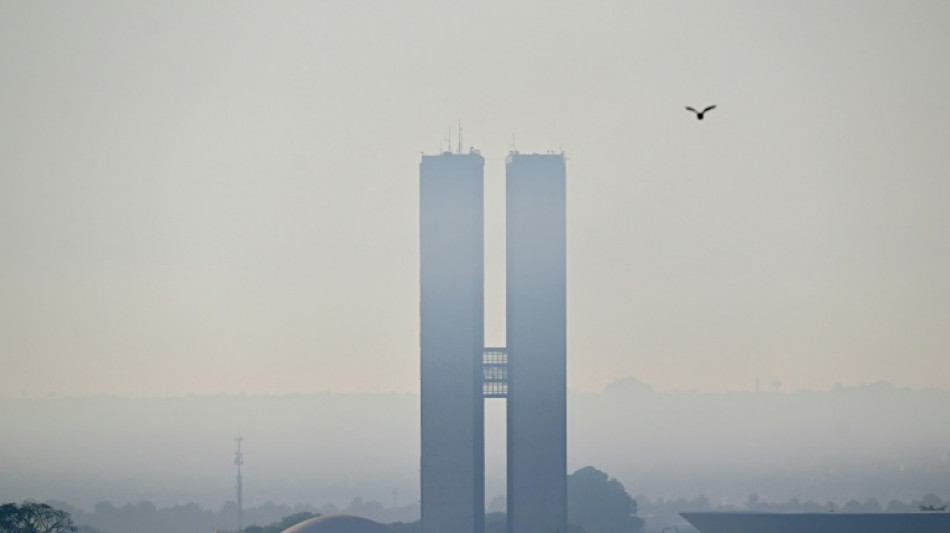
| RYCEF | -0.14% | 7.27 | $ | |
| RBGPF | 0% | 60.5 | $ | |
| CMSC | 0.08% | 23.86 | $ | |
| AZN | 0.8% | 65.875 | $ | |
| SCS | -1.21% | 11.6 | $ | |
| GSK | 0.24% | 33.68 | $ | |
| NGG | 0.26% | 58.65 | $ | |
| RIO | 0.05% | 58.67 | $ | |
| CMSD | -0.06% | 23.545 | $ | |
| VOD | -1.02% | 8.305 | $ | |
| BCE | -2.07% | 22.69 | $ | |
| BTI | -0.6% | 36.025 | $ | |
| RELX | -0.55% | 45.22 | $ | |
| BP | -0.69% | 28.405 | $ | |
| BCC | -0.23% | 122.465 | $ | |
| JRI | 0.12% | 12.075 | $ |

Brazilians choke as fire smoke blankets 80% of country
With as much as 80 percent of Brazil under a blanket of smoke from historic wild fires, face masks last used during the coronavirus pandemic are coming out again.
South America's biggest country has for weeks been choking on pollution along with much of the rest of the continent battling extreme drought and record fires.
Millions of hectares of forest and farmland have burnt in Argentina, Brazil, Bolivia, Colombia, Ecuador, Paraguay and Peru.
The Amazon basin, usually one of the wettest places on Earth, is experiencing its worst fires in nearly two decades, according to the EU's Copernicus observatory.
And last week, satellite images from the National Institute for Space Research (INPE), showed 80 percent of Brazil affected by smoke.
"I am a smoker but I've been coughing more than usual," student Luan Monteiro, 20, told AFP in the port of Rio de Janeiro.
Indeed, experts say that inhaling smoke from the fires has effects comparable to smoking four or five cigarettes a day.
Air pollution can worsen bronchitis and asthma, and the risk is greater the longer the exposure, according to pediatrician Renato Kfouri, vice president of the Brazilian Immunizations Society.
In one of the biggest hospitals in the capital Brasilia, the number of patients treated for respiratory problems in recent days was more than 20 times higher than usual.
- 'I put on my mask' -
In Brasilia, which has seen 160 days without rain, homemaker Valderes Loyola said she had bought a fan she uses to blow over wet towels and buckets of water to try and add some moisture to the dry air.
"When I go out, I put on my mask," the 72-year-old told AFP.
Sao Paulo, Latin America's biggest metropolis, for several days last week was ranked the world’s most polluted city by Swiss-based monitoring firm IQAir.
At least 40 percent of residents of Sao Paulo and Belo Horizonte, and 29 percent in Rio de Janeiro say their health was affected "very much" by pollution, according to pollsters Datafolha.
Internet searches for "air quality" reached record levels in Brazil in recent days, according to the Google Trends tool, which also reported an increase searches for "humidifier" and "air purifier."
Experts warn about outdated air quality monitoring in Brazil, and a dearth of emergency plans to deal with smoke pollution.
Less than 2.0 percent of municipalities have air monitoring stations, Evangelina Araujo of the Instituto Ar pollution think tank told AFP.
And only one in five can detect the fine particles found in smoke that should trigger health warnings.
Authorities blame human activity for most of the recent fires in Brazil -- where they are often linked to land clearing for agriculture.
Neighboring Bolivia on Monday declared a national disaster due to forest fires affecting most of its Santa Cruz department, where authorities said 7.2 million hectares have burned since last week.
R.Vandevelde--JdB



